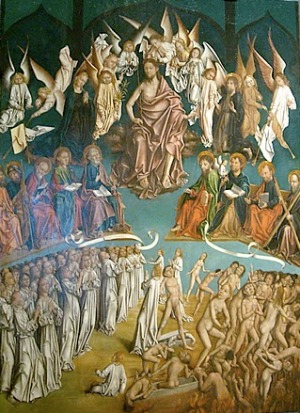The Biblical Concepts of Hell Part III

 In the Old Testament, the Book of Isaiah did not mention Gehenna by name, but did mention the "burning place”[4]. The ancient Aramaic paraphrasing/translations of the Hebrew Bible supply the term "Gehinnom" frequently to verses touching upon resurrection, judgment and the fate of the wicked. This may also include the addition of the phrase "second death", as in the final chapter of the Book of Isaiah. In the logic of the Old Testament, Gehenna is considered a Purgatory-like place where the wicked go to suffer until they have atoned for their sins. It is stated[5] that the maximum amount of time a sinner can spend in Gehenna is one year, with the exception of five people who are there for all of eternity.
In the Old Testament, the Book of Isaiah did not mention Gehenna by name, but did mention the "burning place”[4]. The ancient Aramaic paraphrasing/translations of the Hebrew Bible supply the term "Gehinnom" frequently to verses touching upon resurrection, judgment and the fate of the wicked. This may also include the addition of the phrase "second death", as in the final chapter of the Book of Isaiah. In the logic of the Old Testament, Gehenna is considered a Purgatory-like place where the wicked go to suffer until they have atoned for their sins. It is stated[5] that the maximum amount of time a sinner can spend in Gehenna is one year, with the exception of five people who are there for all of eternity.
Again, all these “places” are deemed to be temporary levels for the departed soul, until the Final Judgment of the soul would occur and the “Second Death”. A citation of this stance is mentioned briefly again in the Apostle‘s Creed, presenting Jesus, the Christ, as the ultimate Judge of the Living and the Dead, but the most eloquent analysis comes from the Book of Revelation.
Revelations: The Judgment of the Dead
“Then I saw a great white throne and him who was seated on it. The earth and the heavens fled from his presence, and there was no place for them. And I saw the dead, great and small, standing before the throne, and books were opened. Another book was opened, which is the book of life. The dead were judged according to what they had done as recorded in the books. The sea gave up the dead that were in it, and death and Hades gave up the dead that were in them, and each person was judged according to what they had done. Then death and Hades were thrown into the lake of fire. The lake of fire is the second death. Anyone whose name was not found written in the book of life was thrown into the lake of fire.”
~Revelation 20:11-15
The fact is that many of these concepts were fashioned through the use of the imagery created by the specific social, religious and political dynamics of the ancient societies. These limited abstract analysis, since every translation carried the weight of various agendas through time. In modern terms, Hell is understood as a state of consciousness, being it incarnated or not. Many Schools of Wisdom make mention about the existence of the Second Death, but that is an ultimately transcended situation, and in itself should not be considered an act of punishment, less yet of torture or castigation per se, but an act of compassion, of Divine balance, and a true dispensation of Divine Grace upon those consciousness/beings who chose not conjoin with the Divine co-creative plan for all.
[1] II Kin. 16; 3; II Chron. 28:1-3; cf. Lev. 18:21; I Kin. 11:5, 7, 33
[2] Jerusalem was conquered by Pompey the Great in approximately 63 BCE.
[3] Damnation, from Latin damnation, is the concept of everlasting divine punishment and/or disgrace, especially the punishment for sin. The Latin verb damnare in Roman law acquired a legal meaning of "to pronounce judgment upon”.
[4] Isaiah 30:33
[5] From the Sanhedrin is one of ten tractates of Seder Nezikin, a section of the Talmud that deals with damages, i.e. civil and criminal proceedings. It originally formed one tractate with Makkot, which also deals with criminal law.








